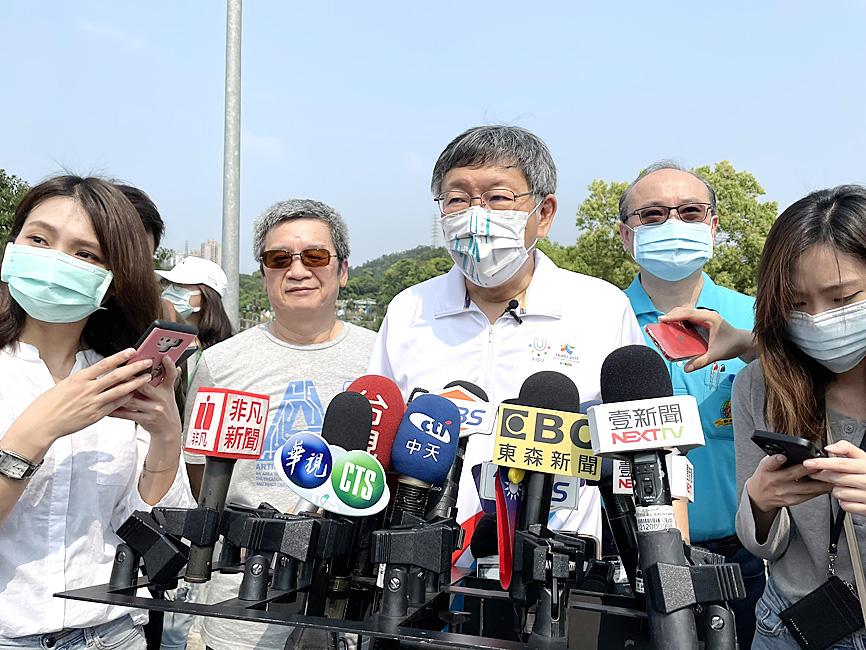China needs to improve its human rights, Taipei Mayor Ko Wen-je (柯文哲) said yesterday, adding that global anti-China sentiment would last for the next 15 years.
Ko was responding to reporters’ questions about a recent Xinjiang cotton controversy.
Swedish fashion retailer H&M faced a backlash in China when social media users circulated a statement it made last year announcing that it would no longer source cotton from Xinjiang due to reports that Uighurs were being used as forced labor there.

Photo: Cheng Ming-hsiang, Taipei Times
Several global retail giants, including Adidas, Nike, Puma and Uniqlo, also face boycotts in China over the issue.
Many Chinese artists, as well as Taiwanese artists who were brand ambassadors, have terminated their contracts with the companies as a show of support for China.
“The trade war between the US and China will certainly continue, but China still has to improve its human rights” record, Ko said.
“Anti-China sentiment will still be a global trend for the next 15 years,” he added.
“I don’t know what China is trying to do,” but Taiwanese are not happy with whatever China is doing to the nation, including its unilateral decision to ban imports of pineapples from Taiwan, frequently having Chinese aircraft enter Taiwan’s air defense identification zone and not allowing Taiwan to enter the WHO, Ko said.
Separately, Chinese Nationalist Party (KMT) Legislator Chiang Wan-an (蔣萬安), who was pictured wearing a pair of avant-garde Nike x Sacai VaporWaffle sneakers in an online post last month, was asked whether he would continue wearing Nike shoes.
He responded that he did not feel the need to stop.
“Human rights is a universal value, so many countries are very concerned about the forced labor of Uighurs and other Muslims in China’s Xinjiang region and their human rights. Chinese authorities should explain the situation and clarify their concerns, rather than stir up nationalism as its response to global society,” he said.
On Saturday, KMT Chairman Johnny Chiang (江啟臣) said on Facebook that “freedom, democracy, human rights and prosperity are the principles and values that the KMT holds in its view on cross-strait and international controversies.”
“Whether it be the Han people, Uighurs or other ethnic minorities, labor rights and religious rights should be guaranteed and respected,” he said.
People in Taiwan have very limited knowledge about what is happening in Xinjiang, so Chinese authorities and the parties concerned should make information transparent, enabling more people to understand the working and living conditions of cotton farmers in Xinjiang, which would help resolve the debate, he said.
Stirring up nationalist rhetoric or reprimanding or boycotting others is not helpful, nor can it help improve the human rights, and living and labor conditions of Uighurs, he said.
Additional reporting by Lin Liang-sheng

Alain Robert, known as the "French Spider-Man," praised Alex Honnold as exceptionally well-prepared after the US climber completed a free solo ascent of Taipei 101 yesterday. Robert said Honnold's ascent of the 508m-tall skyscraper in just more than one-and-a-half hours without using safety ropes or equipment was a remarkable achievement. "This is my life," he said in an interview conducted in French, adding that he liked the feeling of being "on the edge of danger." The 63-year-old Frenchman climbed Taipei 101 using ropes in December 2004, taking about four hours to reach the top. On a one-to-10 scale of difficulty, Robert said Taipei 101

Nipah virus infection is to be officially listed as a category 5 notifiable infectious disease in Taiwan in March, while clinical treatment guidelines are being formulated, the Centers for Disease Control (CDC) said yesterday. With Nipah infections being reported in other countries and considering its relatively high fatality rate, the centers on Jan. 16 announced that it would be listed as a notifiable infectious disease to bolster the nation’s systematic early warning system and increase public awareness, the CDC said. Bangladesh reported four fatal cases last year in separate districts, with three linked to raw date palm sap consumption, CDC Epidemic Intelligence

Taiwanese and US defense groups are collaborating to introduce deployable, semi-autonomous manufacturing systems for drones and components in a boost to the nation’s supply chain resilience. Taiwan’s G-Tech Optroelectronics Corp subsidiary GTOC and the US’ Aerkomm Inc on Friday announced an agreement with fellow US-based Firestorm Lab to adopt the latter’s xCell, a technology featuring 3D printers fitted in 6.1m container units. The systems enable aerial platforms and parts to be produced in high volumes from dispersed nodes capable of rapid redeployment, to minimize the risk of enemy strikes and to meet field requirements, they said. Firestorm chief technology officer Ian Muceus said

MORE FALL: An investigation into one of Xi’s key cronies, part of a broader ‘anti-corruption’ drive, indicates that he might have a deep distrust in the military, an expert said China’s latest military purge underscores systemic risks in its shift from collective leadership to sole rule under Chinese President Xi Jinping (習近平), and could disrupt its chain of command and military capabilities, a national security official said yesterday. If decisionmaking within the Chinese Communist Party has become “irrational” under one-man rule, the Taiwan Strait and the regional situation must be approached with extreme caution, given unforeseen risks, they added. The anonymous official made the remarks as China’s Central Military Commission Vice Chairman Zhang Youxia (張又俠) and Joint Staff Department Chief of Staff Liu Zhenli (劉振立) were reportedly being investigated for suspected “serious